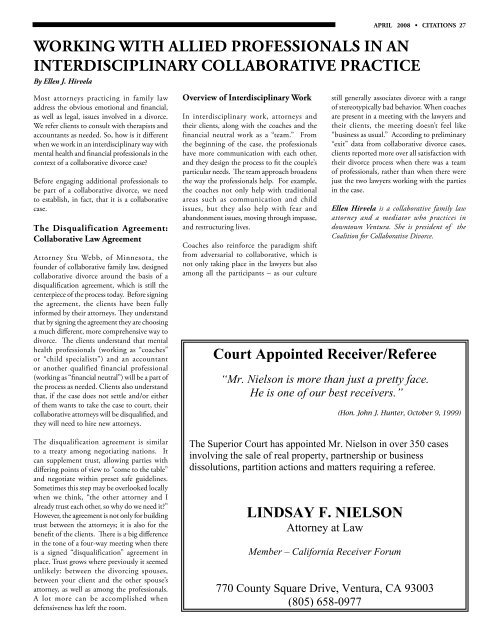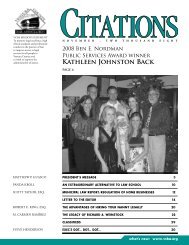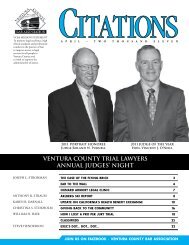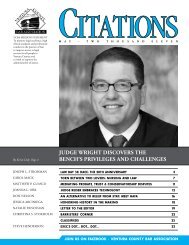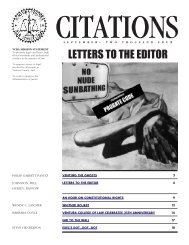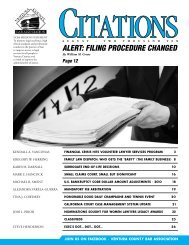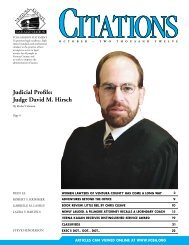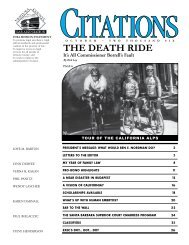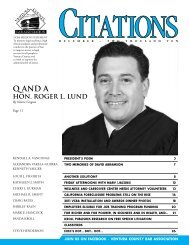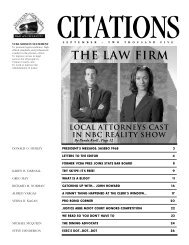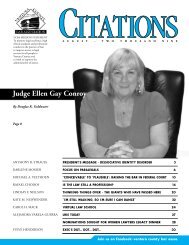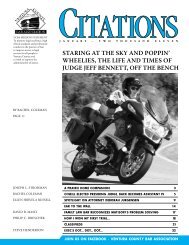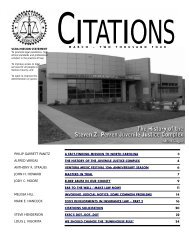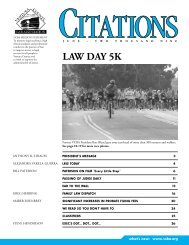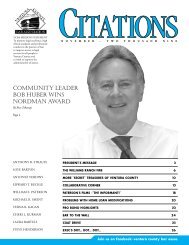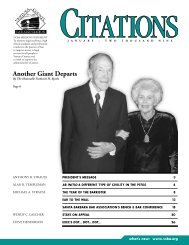LINCOLN ON E-MAIL - Ventura County Bar Association
LINCOLN ON E-MAIL - Ventura County Bar Association
LINCOLN ON E-MAIL - Ventura County Bar Association
Create successful ePaper yourself
Turn your PDF publications into a flip-book with our unique Google optimized e-Paper software.
APRIL 2008 • CITATI<strong>ON</strong>S 27<br />
Working with Allied Professionals in an<br />
Interdisciplinary Collaborative Practice<br />
By Ellen J. Hirvela<br />
Most attorneys practicing in family law<br />
address the obvious emotional and financial,<br />
as well as legal, issues involved in a divorce.<br />
We refer clients to consult with therapists and<br />
accountants as needed. So, how is it different<br />
when we work in an interdisciplinary way with<br />
mental health and financial professionals in the<br />
context of a collaborative divorce case?<br />
Before engaging additional professionals to<br />
be part of a collaborative divorce, we need<br />
to establish, in fact, that it is a collaborative<br />
case.<br />
The Disqualification Agreement:<br />
Collaborative Law Agreement<br />
Attorney Stu Webb, of Minnesota, the<br />
founder of collaborative family law, designed<br />
collaborative divorce around the basis of a<br />
disqualification agreement, which is still the<br />
centerpiece of the process today. Before signing<br />
the agreement, the clients have been fully<br />
informed by their attorneys. They understand<br />
that by signing the agreement they are choosing<br />
a much different, more comprehensive way to<br />
divorce. The clients understand that mental<br />
health professionals (working as “coaches”<br />
or “child specialists”) and an accountant<br />
or another qualified financial professional<br />
(working as “financial neutral”) will be a part of<br />
the process as needed. Clients also understand<br />
that, if the case does not settle and/or either<br />
of them wants to take the case to court, their<br />
collaborative attorneys will be disqualified, and<br />
they will need to hire new attorneys.<br />
The disqualification agreement is similar<br />
to a treaty among negotiating nations. It<br />
can supplement trust, allowing parties with<br />
differing points of view to “come to the table”<br />
and negotiate within preset safe guidelines.<br />
Sometimes this step may be overlooked locally<br />
when we think, “the other attorney and I<br />
already trust each other, so why do we need it?”<br />
However, the agreement is not only for building<br />
trust between the attorneys; it is also for the<br />
benefit of the clients. There is a big difference<br />
in the tone of a four-way meeting when there<br />
is a signed “disqualification” agreement in<br />
place. Trust grows where previously it seemed<br />
unlikely: between the divorcing spouses,<br />
between your client and the other spouse’s<br />
attorney, as well as among the professionals.<br />
A lot more can be accomplished when<br />
defensiveness has left the room.<br />
Overview of Interdisciplinary Work<br />
In interdisciplinary work, attorneys and<br />
their clients, along with the coaches and the<br />
financial neutral work as a “team.” From<br />
the beginning of the case, the professionals<br />
have more communication with each other,<br />
and they design the process to fit the couple’s<br />
particular needs. The team approach broadens<br />
the way the professionals help. For example,<br />
the coaches not only help with traditional<br />
areas such as communication and child<br />
issues, but they also help with fear and<br />
abandonment issues, moving through impasse,<br />
and restructuring lives.<br />
Coaches also reinforce the paradigm shift<br />
from adversarial to collaborative, which is<br />
not only taking place in the lawyers but also<br />
among all the participants – as our culture<br />
still generally associates divorce with a range<br />
of stereotypically bad behavior. When coaches<br />
are present in a meeting with the lawyers and<br />
their clients, the meeting doesn’t feel like<br />
“business as usual.” According to preliminary<br />
“exit” data from collaborative divorce cases,<br />
clients reported more over all satisfaction with<br />
their divorce process when there was a team<br />
of professionals, rather than when there were<br />
just the two lawyers working with the parties<br />
in the case.<br />
Ellen Hirvela is a collaborative family law<br />
attorney and a mediator who practices in<br />
downtown <strong>Ventura</strong>. She is president of the<br />
Coalition for Collaborative Divorce.<br />
Court Appointed Receiver/Referee<br />
“Mr. Nielson is more than just a pretty face.<br />
He is one of our best receivers.”<br />
(Hon. John J. Hunter, October 9, 1999)<br />
The Superior Court has appointed Mr. Nielson in over 350 cases<br />
involving the sale of real property, partnership or business<br />
dissolutions, partition actions and matters requiring a referee.<br />
LINDSAY F. NIELS<strong>ON</strong><br />
Attorney at Law<br />
Member – California Receiver Forum<br />
770 <strong>County</strong> Square Drive, <strong>Ventura</strong>, CA 93003<br />
(805) 658-0977


